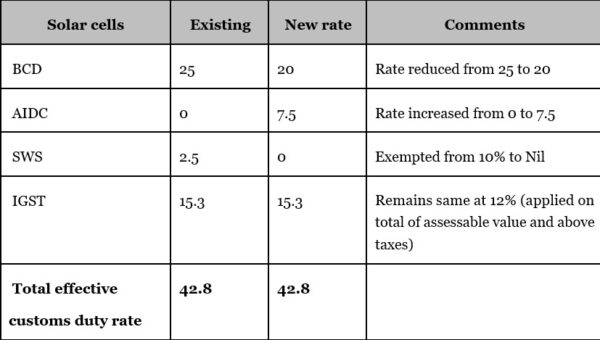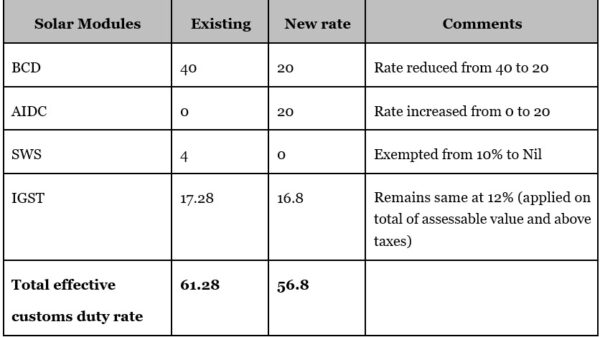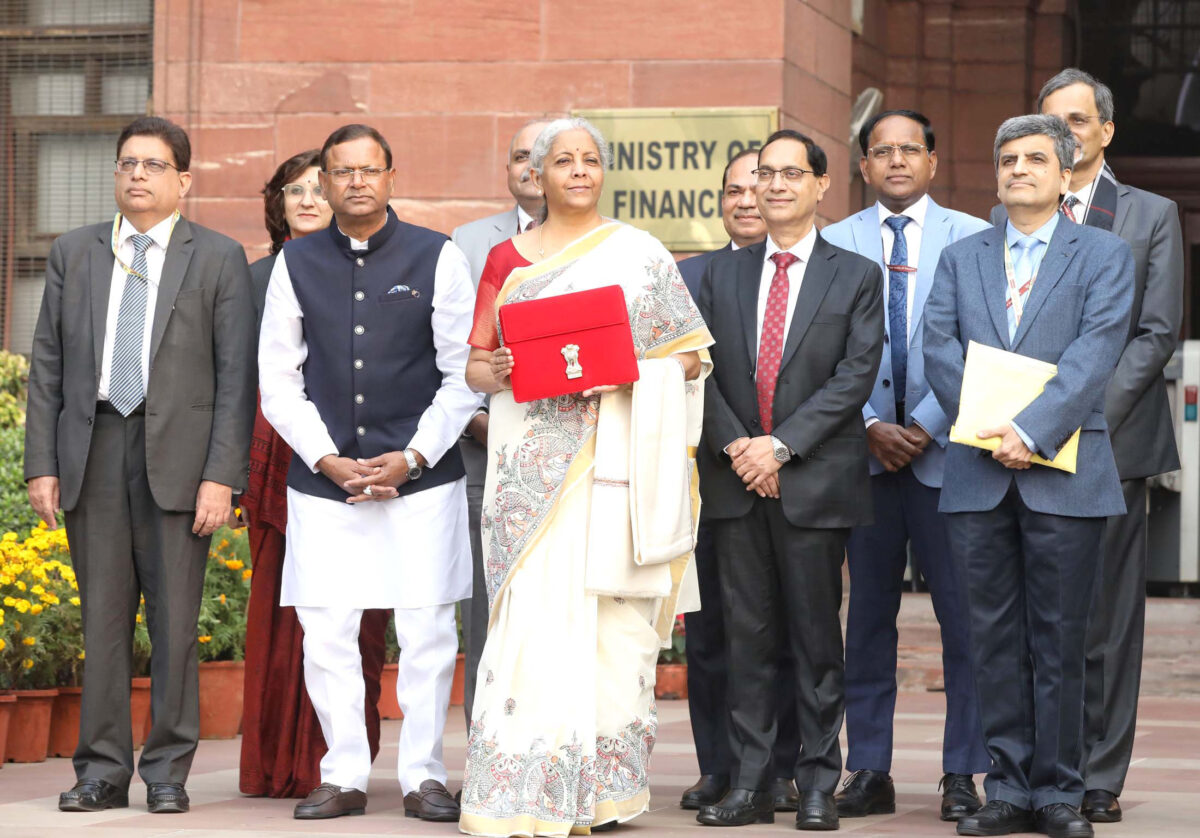The Union Budget 2025-26 proposes to fully exempt basic customs duty on scrap of lithium-ion batteries and critical minerals with a view to securing raw material availability for lithium battery manufacturing in India. Specifically, cobalt powder and waste, the scrap of lithium-ion battery, lead, zinc and 12 more critical minerals will attract nil customs duty. This is in addition to the 25 critical minerals fully exempted of BCD in July 2024 Budget.
Presenting the budget, finance minister Nirmala Sitharaman said that this [the exemption] will help secure [the raw materials’] availability for manufacturing in India and promote more jobs for the youth.
The budget also proposes to add 35 additional capital goods for EV battery manufacturing to the list of exempted capital goods, to boost domestic manufacture of lithium-ion battery.
As for solar, the government’s subsidy scheme for residential rooftop PV installations, PM Surya Ghar Muft Bijli Yojana, has been allocated a substantial INR 20,000 crore, against INR 11,100 crore (revised) in 2024-25. PM KUSUM Scheme, which aims at ensuring energy security for farmers, has been allocated INR 2,600 crore against INR 2525 crore (revised) in 2024-25.
Basic customs duty on solar cell imports has been reduced to 20% from 25% earlier. However, an agriculture infrastructure and development cess (AIDC) of 7.5% has been levied on these, against collection of social welfare surcharge at 2.5% in the previous duty regime. [AIDC is a special-purpose tax levied by the government to raise funds for the development of agriculture infrastructure projects.] Similarly, solar module imports now attract a reduced customs duty of 20% against 40% earlier, but face AIDC of 20% against 4% SWS in the previous duty regime.
Independent consultant Vinay Rustagi told pv magazine, “[For solar cells] there is no real change as the reduction in BCD is offset by a new equivalent levy of AIDC (agriculture infrastructure and development cess) levy. We see this as a mere definitional tweak with no net impact on any stakeholders.”
“On the import of solar modules, there is an overall duty reduction of 4.48%. The effective customs duty rate is now 56.8% (considering 20% BCD, 20% AIDC, nil SWS, and IGST 12% on total, against the existing 61.28%,” shared SK Gupta, Director and CFO, AMPIN Energy Transition.

AMPIN Energy Transition

AMPIN Energy Transition
The finance minister announced that the government will set up a National Manufacturing Mission covering small, medium and large industries for furthering “Make in India” by providing policy support, execution roadmaps, governance and monitoring framework for central ministries and states. The Mission will also support clean tech manufacturing with aim to improve domestic value addition and build the ecosystem for solar PV cells, EV batteries, motors and controllers, electrolyzers, wind turbines, very high voltage transmission equipment and grid-scale batteries.
The minister said development of at least 100 GW of nuclear energy by 2047 is essential for India’s energy transition efforts. “For an active partnership with the private sector towards this goal, amendments to the Atomic Energy Act and the Civil Liability for Nuclear Damage Act will be taken up. A Nuclear Energy Mission for research & development of Small Modular Reactors (SMR) with an outlay of INT 20,000 crore will be set up. At least five indigenously developed SMRs will be operationalized by 2033.”
Industry feedback
Customs duty waiver on lithium battery and critical minerals scrap provides a boost to the domestic recycling industry, which has seen entry of many new players. In comparison to virgin mining, which is costly as well as unsustainable, recycling consumes much fewer resources and takes less time translating to lower environmental impact. “Extracting one ton of lithium requires about 28 tons of end-of-life Li-ion batteries, compared to 250 tons of ore or 750 tons of brine.it also takes several months to a few years to refine lithium along with using huge amounts of water,” says Manikumar Uppala, co founder and chief of industrial engineering, battery recycling startup Metastable Materials.
Nitin Gupta, CEO & Co-founder, Attero (an e-waste and lithium-ion battery recycler), says, “The proposal to fully exempt Basic Customs Duty (BCD) on cobalt powder, lithium-ion battery waste, and other critical minerals is a crucial step toward securing raw materials for domestic manufacturing and building a self-sufficient supply chain. Additionally, the planned policy on recovering critical minerals from tailings will significantly benefit refining players like Attero.”
The budget has been lauded by the solar industry as well, specifically for its focus on domestic manufacturing support through the National Manufacturing Mission.
Neerav Nanavaty, CEO, BluPine Energy, said, “The budget lays out a bold and pragmatic roadmap for India’s clean energy future. The focus on boosting domestic manufacturing of EV batteries, solar panels, and other clean tech components will strengthen our supply chains and reduce import dependencies”
“Power sector reforms, particularly incentives for distribution companies and intra-state transmission upgrades, will further improve grid efficiency and financial viability. The Nuclear Energy Mission, with its ambitious 100 GW target and support for Small Modular Reactors, shows a strong commitment to diversifying the country’s energy mix.”
Sameer Gupta, Chairman of Jakson Group, said, “The budgetary focus on escalating infrastructure investment, particularly through the allotment of INR 1.5 lakh crore for state capital expenditure, underscores a strategic move towards strengthening India’s core sectors. The commitment of INR 10 lakh crore for new projects under the Asset Monetization Plan 2025-30 promises significant enhancements in energy and infrastructure capabilities. Additionally, the emphasis on renewable sectors with initiatives in solar energy and biofuels aligns with industry needs for sustainable development. The new manufacturing mission under Make in India is a defining step toward building India’s self-sufficiency in solar, hydrogen, and storage technologies. By fostering an integrated ecosystem, we are not just reducing import dependence but creating a foundation for India to lead the global clean energy revolution.”
Amit Paithankar, whole-time director & CEO, Waaree Energies, said. “The Union Budget 2025 has strengthened India’s pledge to clean energy self-reliance by prioritizing domestic manufacturing, backward integration, skilling, and research & development. The announcement of the National Manufacturing Mission, along with enhanced PLI schemes and tariff rationalization for critical minerals will support the rapid growth of the entire renewable energy ecosystem. The inclusion of lithium-ion battery manufacturing incentives and duty exemptions on key raw materials like cobalt and lithium will accelerate India’s emergence as a global hub for energy storage solutions, furthering the EV and solar industries. The focus on clean-tech is heartening, as it reinforces the long-term relevance of renewable energy in India’s economic and environmental future. Additionally, the establishment of the National Centre of Excellence in Skilling, coupled with the PM Research Fellowship and industry-driven initiatives, will empower a wider segment of India’s youth with industry-relevant expertise.
Varchasvi Gagal, Managing Director & CEO of Datta Infra, sees the initiative to promote solar cell manufacturing [National Manufacturing Mission] as a strategic step towards creating a robust manufacturing ecosystem in India, supported by the Production-Linked Incentive (PLI) scheme. According to him, this initiative will have a two-fold impact. Firstly, it will enhance India’s self-reliance in solar cell production, aligning with the government’s vision of Atmanirbhar Bharat. Secondly, it will significantly accelerate the country’s progress towards achieving its ambitious 500 GW renewable energy target by 2030.
SK Gupta, Director and CFO, AMPIN Energy Transition, said, “Budget ‘2025’ is a welcome growth oriented budget aiming to provide transformative reforms to critical sectors of both fiscal and core development of the economy. The National Manufacturing Mission with continued focus on ‘Cleantech’ will further help diversify manufacturing across states, create jobs and make a larger contribution to national GDP in coming times. Relief in personal taxation limits is again a welcome change and is expected to act as a catalyst: promote both savings and consumption in the economy, in coming times.”
Chetan Shah, Chairman & MD, Solex Energy, said, ” The announcement of a National Manufacturing Mission to support clean-tech manufacturing, including EV batteries and solar panels, is a welcome step that will boost domestic production, reduce import dependency, and create high-value employment. The allocation of INR 1,500 crore to the solar power (grid) segment further reinforces India’s commitment to accelerating the renewable energy transition. This investment will be crucial in strengthening grid infrastructure, enhancing solar adoption, and driving the nation closer to its clean energy goals. Furthermore, the government’s commitment to 100 GW of nuclear power by 2047 and support for Small Modular Reactors (SMRs) marks a strategic shift in India’s energy mix, ensuring reliable base-load power alongside aggressive renewable expansion.
Bikesh Ogra, MD and CEO, Jakson Green, said, “The Make in India mission will establish India as a global renewable energy hub by reducing import dependence, creating jobs. Crucially, the budget emphasizes power sector reforms, incentivizing states to modernise distribution and transmission infrastructure i.e essential for seamlessly integrating RE sources into the grid and ensuring a stable power supply. The proposed PPP [public-private partnership] model for infrastructure development, coupled with substantial interest-free loans, will catalyse investments in RE projects.”
This content is protected by copyright and may not be reused. If you want to cooperate with us and would like to reuse some of our content, please contact: editors@pv-magazine.com.









1 comment
By submitting this form you agree to pv magazine using your data for the purposes of publishing your comment.
Your personal data will only be disclosed or otherwise transmitted to third parties for the purposes of spam filtering or if this is necessary for technical maintenance of the website. Any other transfer to third parties will not take place unless this is justified on the basis of applicable data protection regulations or if pv magazine is legally obliged to do so.
You may revoke this consent at any time with effect for the future, in which case your personal data will be deleted immediately. Otherwise, your data will be deleted if pv magazine has processed your request or the purpose of data storage is fulfilled.
Further information on data privacy can be found in our Data Protection Policy.